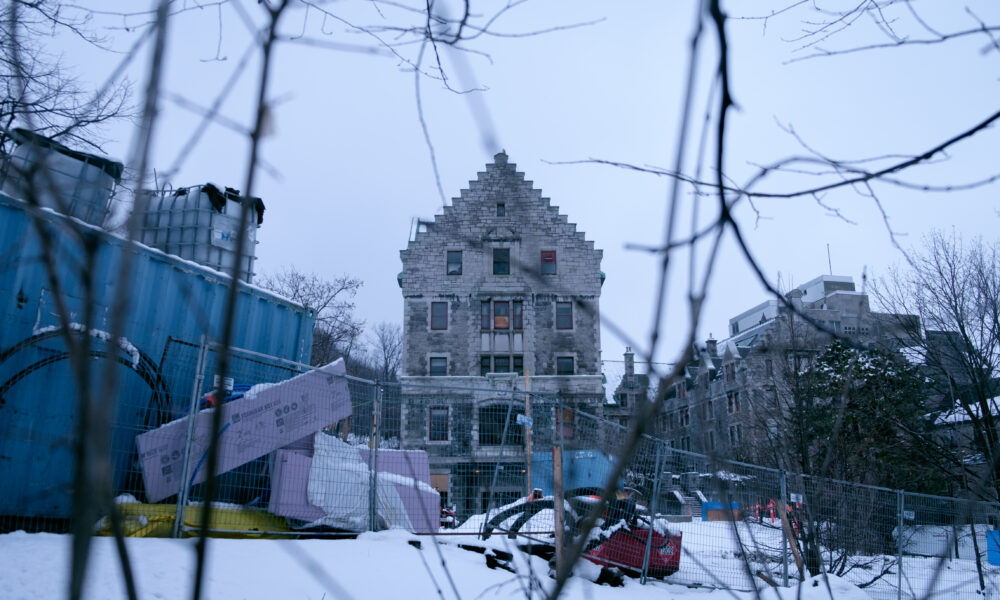In 2022, McGill University began on-site work at the Royal Victoria Hospital (RVH) site, in service of the New Vic Project. They proposed the expansion project would facilitate “state-of-the-art research”; however, the McGill administration failed to complete a thorough survey of the area and investigate the possibility of unmarked graves from victims of medical experiments and malpractice on the site of the former Royal Victoria Hospital (RVH). The harmful medical and burial practices that took place at the RVH, along with McGill’s involvement with the MK ULTRA experiments, were forms of violence that disproportionately affected Indigenous communities. In Oct. 2022, the Kanien’kéha:ka Kahnistensera (Mohawk Mothers) secured a Quebec Superior Court injunction to ensure a vigilant and culturally sensitive approach to unmarked graves. Taiaiake Alfred’s appointment as McGill’s Senior Policy Advisor in June 2023—which coincided with news of the Historic Human Remains Detection Dogs’ discovery of the scent of potential human remains on the RVH site—prompts scrutiny of the university’s commitment to Indigenous oversight.
Alfred works with the Mohawk Council of Kahnawake (MCK), a band council formed under the Indian Act. Attracting very few voters and little support in Kahnawake, the council operates far from the consensus mandated by the Longhouse’s traditional decision-making system. Traditionalists have widely criticized his work on a “new governance project” for the MCK as replacing their ancestral government with band council governance structures imposed by colonial powers. One such criticism is that many workshops associated with this system of leadership did not allow anyone over 35 to attend. Therefore, Alfred’s questionable vision of a new way of governance was shielded from the oversight and criticism of elders and has the potential to mislead younger generations. This problematizes his alignment with colonial structures and indicates concerning implications for Indigenous peoples and perspectives at McGill.
Alfred’s new role at McGill follows his controversial exit from the University of Victoria (UVic) amid accusations of a toxic environment in their Indigenous Governance program. When //Two Row Times// asked for a response to the allegations, Alfred, who regularly puts forward his U.S. Marine infantry veteran status, said “[I]f you’re asking me if I’m hyper-masculine, well, I’m Mohawk from Kahnawake.” This puzzling assertion raises concerns about his accountability, particularly given the matriarchal nature of Kanien’kéha:ka traditions and that the Kahnistensera are from Kahnawake.
As the Senior Policy Advisor, Alfred’s responsibilities include guiding Indigenous policy development at McGill. But his public history raises serious questions about his ability to represent the interests of Indigenous communities and students. Will Alfred’s appointment only ensure that Indigenous consultation aligns with McGill’s objectives?
Beyond the immediate concerns regarding the New Vic Project, McGill’s track record of sidelining Indigenous voices and resisting court-ordered oversight is abhorrent. Their ongoing defiance against the Kanien’kéha:ka Kahnistensera and their appeal against a court-ordered reinstatement of an archaeological panel reveals the hypocrisy of the administration’s stated dedication to ethical practices and Indigenous rights.
Over the past eight years, the Kahnistensera have engaged in a multi-layered struggle against McGill, the Société québécoise des infrastructures (SQI), and others. Their legal battles, including their landmark injunction in Quebec Superior Court, showcase persistent efforts to protect unmarked graves around the former Royal Victoria Hospital. Despite court orders, McGill and SQI’s actions during archaeological investigations, including the disbanding of an independent expert panel of archaeologists, underscore this process’ lack of integrity.
The New Vic Project uses a destructive and denialist strategy to undermine the stories of survivors who witnessed and suffered the atrocities that occurred at the RVH site. McGill’’s actions suggest a pattern of prioritizing expansion over ethics, and Alfred’s role seems to be an attempt to legitimize disregard for valid Indigenous concerns and shield the university from rightful criticism.McGill must foster meaningful engagement with Indigenous communities on their own terms. Seeking validation that supports the administration’s opportunist agenda is unacceptable. The university must uphold basic principles of equity, justice, and respect for nature and end its support for toxic, patriarchal behaviours, and extractive practices. Let us seize this opportunity to honour the wisdom of the Great Law of Peace that guides the Mohawk Mothers and the land McGill occupies, and genuinely embark on a journey of reconciliation, unity, and collective well-being.








